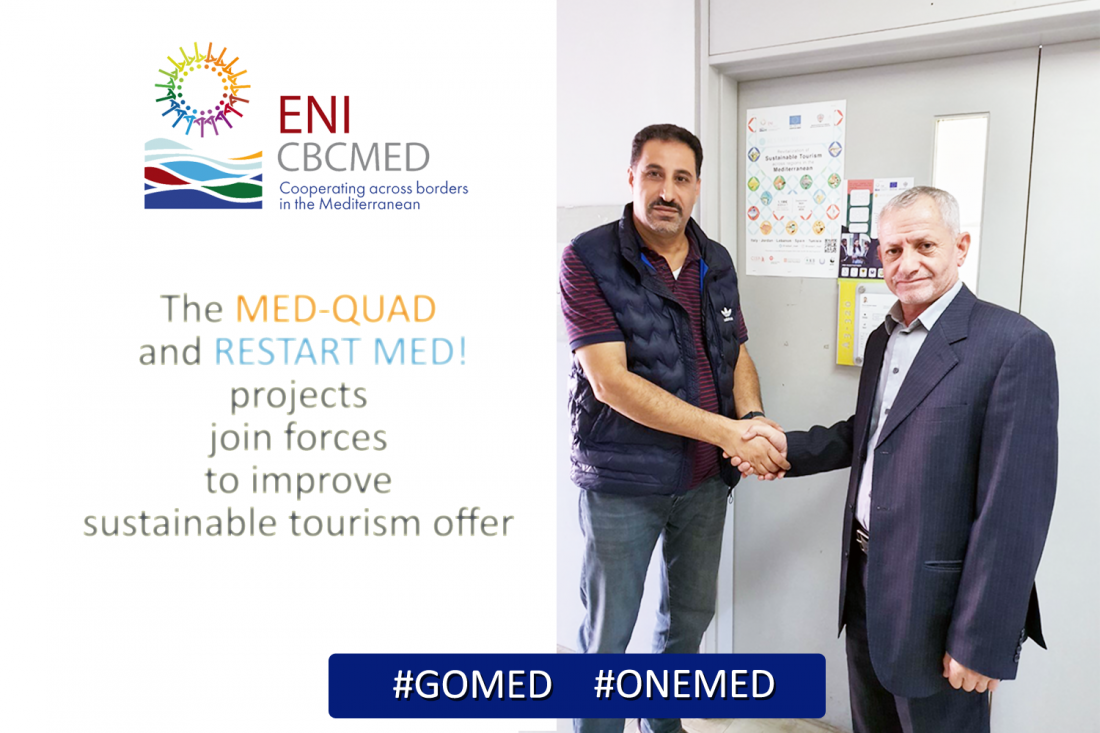The MED-QUAD and RESTART MED projects join forces to improve sustainable tourism offer.

On November 9th, 2022, representatives of MED-QUAD and RESTART MED! projects funded under the ENI CBC Med Programme, met in Jordan and identified common priorities and goals for the economy's return, especially after the pandemic Covid 19 and the development potential of the tourism sector. The constructive discussion of the partners led to the conclusion of synergy between the two projects.
The REvitalization of Sustainable Tourism Across Regions in The MEDiterranean (RESTART MED!) aims to revitalise the tourism economy after the COVID-19 pandemic by building on and learning from previous experiences and practices, using this moment to boost sustainability together with the economic recovery of this crucial industry. On the other hand, MEDiterranean QUadruple helix Approach to Digitalisation (MED-QUAD) project aims to cooperate and interact with the four key factors of innovation (universities/research centres, businesses, local government, and society).
The Applied Research for Cultural Heritage Exploitation – ARCHEO living lab created in the frame of MED-QUAD will collaborate cross-border with the other living laboratories in Greece, Italy, Egypt, Palestine, and Tunisia. In an open space, by utilizing modern technological means and tools, visitors will have the opportunity at the ARCHEO living lab to get to know, through the virtual tour, valuable points of cultural interest. Moreover, the City Development Groups (CDGs) and the role of Civic University were the gold standard for developing cooperation with the RESTART MED! project. Expanding opportunities to get to know culture is expected to contribute positively to the tourism sector and the improvement or creation of sustainable policies. The exchange of know-how and experiences between the partners of the two projects will positively impact the operators of the quadruple helix approach, economic development, and innovation. Important factors that determine the decision-making for the improvement of the tourism offer, the preservation of the cultural heritage and the continuation from the next generations can be considered by the relevant parties involved and contribute to the development of the local society and the economy. The need for economic recovery and strengthening of tourism in the Mediterranean countries is more significant after the Covid-19 pandemic. The collaboration between the two projects is essential because it will contribute to investigating methods and finding possible solutions for businesses and society by exploiting technology and the cooperation of expert scientists.
The representative of the AL-Balqa Applied University (BAU) and MED-QUAD project partner from Jordan, Prof. Rebhi Damseh and the RESTART MED! project representative, Prof. Ahmed Freewan, from Jordan University of Science and Technology (JUST), set the basis of the collaboration in this direction. According to the cooperation, a positive change is expected through resetting basic tourism principles where the diversified, sustainable offer and common branding will reattract tourists. This will be achieved via the project's reinforcement and extension of stakeholder networks, which will raise awareness among CDGs and policy-makers, promoting sustainable tourism good practices among them and supporting mainstreaming into policies.
Standards will be raised to exploit natural, historical, cultural and environmental resources through responsible tourism: more jobs created, increased income for local communities and avoiding seasonality of tourism products. The innovative QH approach to innovation will be explained and disseminated through Κey Εnabling Τechnologies (KETs) applied to Cultural Heritage preservation. A clear roadmap for further actions will be presented to the relevant authorities, who will sign an Action Plan for sustainability.
The Mediterranean as a whole will be better recognized as a sustainable tourism destination, resulting in increased arrivals of responsible tourists and a fairer geographical distribution of benefits: tourism also reaches remote and rural areas.







